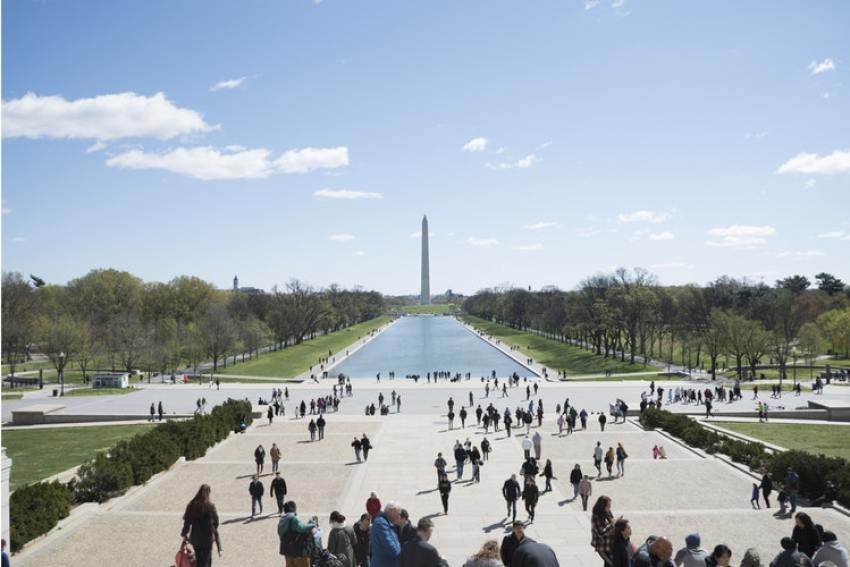House Democrats pass DC statehood bill; critics slam move as 'power grab'

The United States House of Representatives has passed a bill that would admit the District of Columbia to the Union as the 51st state, a move critics are calling a “power grab.”
The "Washington, D.C. Admission Act" passed the House Thursday on a party-line vote, with 216 Democrats voting in favor of the measure and 208 Republicans voting against it. The wide partisan divide surrounding the D.C. statehood debate reflects the fact that should the overwhelmingly Democratic District of Columbia become the 51st state in the Union, it would almost certainly send two Democratic senators to the Senate and a Democratic Congresswoman to the House, tilting the balance of power in Democrats’ favor.
Eleanor Holmes Norton, the non-voting delegate representing the District of Columbia in Congress, made the case for statehood on the House floor Thursday: “This country was founded on the principles of no taxation without representation and consent of the governed, but D.C. residents are taxed without representation and cannot consent to the laws under which they, as American citizens, must live.”
According to Norton, “D.C.’s population of 712,000 is larger than two states. D.C. pays more federal taxes per capita than any state and pays more federal taxes than 21 states. D.C.’s gross domestic product is larger than 17 states.”
“Congress has a choice,” she continued. “It can continue to exclude D.C. residents from the democratic process, forcing them to watch from the sidelines as Congress votes on federal and D.C. laws, and to treat them, in the words of Frederick Douglass, ‘as aliens, not citizens, but subjects.’ Or it can live up to the nation’s founding principles, join the 54 percent of Americans — and growing — who support D.C. statehood and pass H.R. 51.”
Recognizing the policy implications that would come with an increased Democratic majority in Congress, conservative groups quickly condemned the passage of the D.C. statehood bill.
Marjorie Dannenfelser, president of the pro-life group Susan B. Anthony List, lamented that “Radical pro-abortion Democrats in the House are ignoring the Constitution’s principles regarding the seat of federal government to push for D.C. statehood, knowing it would stymy pro-life legislation, and force Americans in our nation’s capital to fund abortion on demand.”
“This is their latest power grab and attempt to change the rules in order to advance the worst of their agenda before the 2022 midterm elections. Make no mistake, they pursue this deeply unpopular agenda at their own political peril,” she added.
In a letter addressed to members of Congress, Dannenfelser elaborated on her concerns about the bill. She explained that “the Dornan Amendment, sometimes referred to as the District of Columbia (D.C.) Amendment, is a funding ban in the Financial Services and General Government Appropriations Bill that ensures taxpayer money cannot finance abortions in the District of Columbia.”
“D.C. statehood would remove the ability for the federal government to limit such funding,” she warned. “If D.C. were to become the 51st state, it would join the list of states that use state tax dollars to fund abortions for women enrolled in Medicaid.”
Dannenfelser also described the attempt to admit D.C. as a state as “an attempt to add two Democratic senators to the Senate where they would stand in the way of pro-life legislation designed to defend our most basic rights, the first of which is life.” She expressed concern that the two Democratic senators that would represent D.C. in the Senate would “undoubtedly vote in lockstep with the abortion lobby to confirm only the most radical pro-abortion judges and justices.”
Additionally, critics of the push to make D.C. a state cite the U.S. Constitution as another reason for their opposition. In a June 2020 op-ed for the Boston Globe, Jeff Jacoby explained that “Article I, Section 8 provides explicitly for a national capital that would not be part of a state nor treated as a state, but rather a unique enclave under the exclusive authority of Congress — a neutral ‘district’ in which representatives of all the states could meet on an equal footing to conduct the nation’s business.”
In addition to criticizing the push for D.C. statehood, the conservative group FreedomWorks has called on Congress to support the D.C.-Maryland Reunion Act. This legislation, introduced by Rep. Dusty Johnson, R-S.D., would make the areas outside of the National Mall, the Capitol and the White House part of Maryland, thereby giving its residents voting representation in Congress without adding any new states to the Union and maintaining Capitol Hill as the neutral “district” that Article I, Section 8 of the Constitution calls for.
While the Washington, D.C. Admission Act has passed the House of Representatives, it faces an uphill climb to passage in the Senate. Although Democrats have a 50-50 majority in the Senate, with Vice President Kamala Harris casting the tie-breaking vote, the filibuster rule requires most legislation to receive 60 votes for passage.
Currently, the Senate version of the Washington, D.C. Admission Act, sponsored by Sen. Tom Carper, D-Del., only has 44 co-sponsors. Sens. Mark Kelly, D-Ariz., Joe Manchin, D-W.V., Jeanne Shaheen, D-N.H., and Krysten Sinema, D-Ariz., as well as Sen. Angus King, an independent who caucuses with Democrats, have yet to sign on as co-sponsors. Like the House version of the bill, the Senate version of the D.C. statehood measure is not expected to accumulate any Republican support.
The House had previously passed a D.C. statehood bill last year, but the bill was never brought up for a vote in the Republican-controlled Senate. Polling has shown that the support for D.C. statehood has grown over time.
According to a 2021 poll by Data for Progress, a liberal group, 54% of Americans support making Washington, D.C., a state. A 2019 Gallup poll found that just 64% of Americans support D.C. statehood. In 2016, 86% of District of Columbia residents voted to approve a referendum that would add Washington, D.C., to the Union as the 51st state.



























